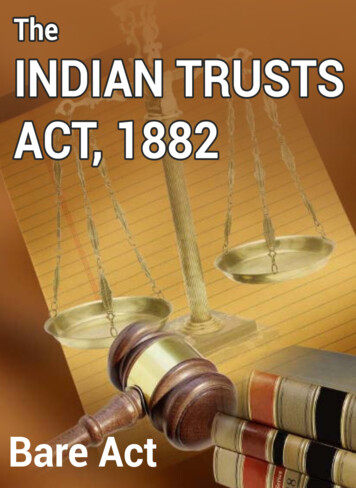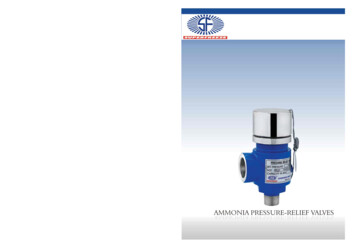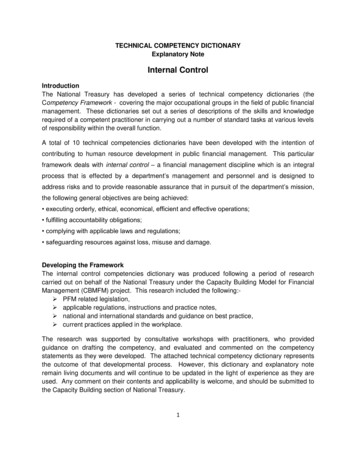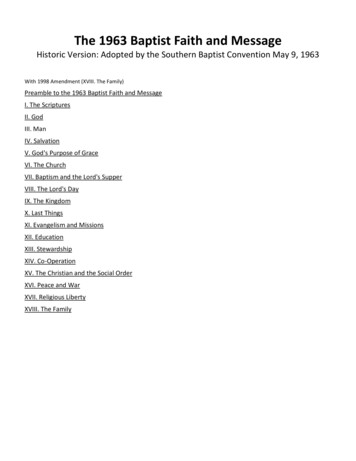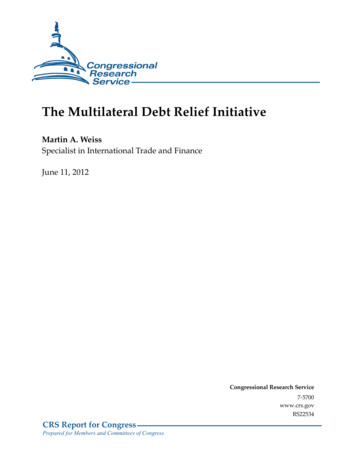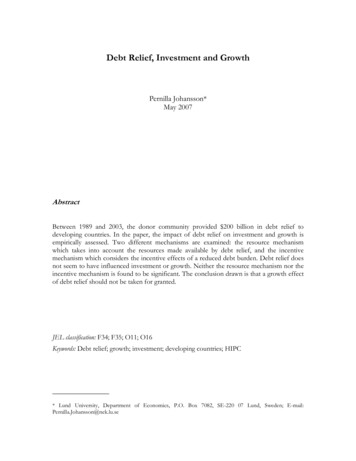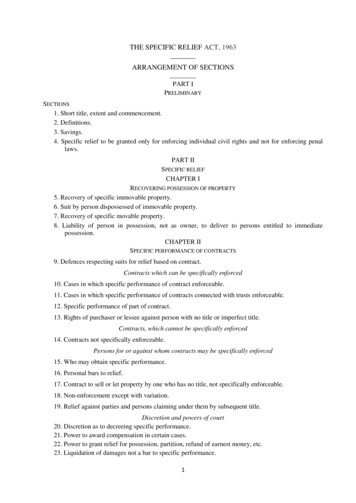
Transcription
THE SPECIFIC RELIEF ACT, 1963ARRANGEMENT OF SECTIONSPART IPRELIMINARYSECTIONS1. Short title, extent and commencement.2. Definitions.3. Savings.4. Specific relief to be granted only for enforcing individual civil rights and not for enforcing penallaws.PART IISPECIFIC RELIEFCHAPTER IRECOVERING POSSESSION OF PROPERTY5. Recovery of specific immovable property.6. Suit by person dispossessed of immovable property.7. Recovery of specific movable property.8. Liability of person in possession, not as owner, to deliver to persons entitled to immediatepossession.CHAPTER IISPECIFIC PERFORMANCE OF CONTRACTS9. Defences respecting suits for relief based on contract.Contracts which can be specifically enforced10. Cases in which specific performance of contract enforceable.11. Cases in which specific performance of contracts connected with trusts enforceable.12. Specific performance of part of contract.13. Rights of purchaser or lessee against person with no title or imperfect title.Contracts, which cannot be specifically enforced14. Contracts not specifically enforceable.Persons for or against whom contracts may be specifically enforced15. Who may obtain specific performance.16. Personal bars to relief.17. Contract to sell or let property by one who has no title, not specifically enforceable.18. Non-enforcement except with variation.19. Relief against parties and persons claiming under them by subsequent title.Discretion and powers of court20. Discretion as to decreeing specific performance.21. Power to award compensation in certain cases.22. Power to grant relief for possession, partition, refund of earnest money, etc.23. Liquidation of damages not a bar to specific performance.1
SECTIONS24. Bar of suit for compensation for breach after dismissal of suit for specific performance.Enforcement of awards and directions to execute settlements25. Application of preceding sections to certain awards and testamentary directions to executesettlements.CHAPTER IIIRECTIFICATION OF INSTRUMENTS26. When instrument may be rectified.CHAPTER IVRESCISSION OF CONTRACTS27. When rescission may be adjudged or refused.28. Rescission in certain circumstances of contracts for the sale or lease of immovable property, thespecific performance of which has been decreed.29. Alternative prayer for rescission in suit for specific performance.30. Court may require parties rescinding to do equity.CHAPTER VCANCELLATION OF INSTRUMENTS31. When cancellation may be ordered.32. What instruments may be partially cancelled.33. Power to require benefit to be restored or compensation to be made when instrument is cancelledor is successfully resisted as being void or voidable.CHAPTER VIDECLARATORY DECREES34. Discretion of court as to declaration of status or right.35. Effect of declaration.PART IIIPREVENTIVE RELIEFCHAPTER VIIINJUNCTIONS GENERALLY36. Preventive relief how granted.37. Temporary and perpetual injunctions.CHAPTER VIIIPERPETUAL INJUNCTIONS38. Perpetual injunction when granted.39. Mandatory injunctions.40. Damages in lieu of, or in addition to, injunction.41. Injunction when refused.42. Injunction to perform negative agreement.43. [Repealed.]44. [Repealed.]2
THE SPECIFIC RELIEF ACT, 1963ACT NO. 47 OF 1963[13th December, 1963.]An Act to define and amend the law relating to certain kinds of specific relief.BE it enacted by Parliament in the Fourteenth Year of the Republic of India as follow:—PART IPRELIMINARY1. Short title, extent and commencement.—(1) This Act may be called the Specific ReliefAct, 1963.(2) It extends to the whole of India except the State of Jammu and Kashmir.(3) It shall come into force on such date1 as the Central Government may, by notification in theOfficial Gazette, appoint.2. Definitions.—In this Act, unless the context otherwise requires,—(a) “obligation” includes every duty enforceable by law;(b) “settlement” means an instrument (other than a will or codicil as defined by the IndianSuccession Act, 1925 (39 of 1925), whereby the destination or devolution of successive interests inmovable or immovable property is disposed of or is agreed to be disposed of;(c) “trust” has the same meaning as in section 3 of the Indian Trusts Act, 1882 (2 of 1882), andincludes an obligation in the nature of a trust within the meaning of Chapter IX of that Act;(d) “trustee” includes every person holding property in trust;(e) all other words and expressions used herein but not defined, and defined in the IndianContract Act, 1872 (9 of 1872), have the meanings respectively assigned to them in that Act.3. Savings.—Except as otherwise provided herein, nothing in this Act shall be deemed—(a) to deprive any person of any right to relief, other than specific performance, which he mayhave under any contract; or(b) to affect the operation of the Indian Registration Act, 1908 (16 of 1908), on documents.4. Specific relief to be granted only for enforcing individual civil rights and not for enforcingpenal laws.—Specific relief can be granted only for the purpose of enforcing individual civil rights andnot for the mere purpose of enforcing a penal law.PART IISPECIFIC RELIEFCHAPTER IRECOVERING POSSESSION OF PROPERTY5. Recovery of specific immovable property.—A person entitled to the possession ofspecific immovable property may recover it in the manner provided by the Code of CivilProcedure, 1908 (5 of 1908).6. Suit by person dispossessed of immovable property.—(1) If any person is dispossessed withouthis consent of immovable property otherwise than in due course of law, he or any person claiming1. 1st March, 1964, vide notification No. S.O. 189, dated 13th January, 1964, see Gazette of India, Extraordinary, Part II,sec. 3(ii).3
through him may, by suit, recover possession thereof, notwithstanding any other title that may be set up insuch suit.(2) No suit under this section shall be brought—(a) after the expiry of six months from the date of dispossession; or(b) against the Government.(3) No appeal shall lie from any order or decree passed in any suit instituted under this section, norshall any review of any such order or decree be allowed.(4) Nothing in this section shall bar any person from suing to establish his title to such property and torecover possession thereof.7. Recovery of specific movable property.—A person entitled to the possession of specific movableproperty may recover it in the manner provided by the Code of Civil Procedure, 1908 (5 of 1908).Explanation 1.—A trustee may sue under this section for the possession of movable property to thebeneficial interest in which the person for whom he is trustee is entitled.Explanation 2.—A special or temporary right to the present possession of movable property issufficient to support a suit under this section.8. Liability of person in possession, not as owner, to deliver to persons entitled to immediatepossession.—Any person having the possession or control of a particular article of movable property, ofwhich he is not the owner, may be compelled specifically to deliver it to the person entitled to itsimmediate possession, in any of the following cases:—(a) when the thing claimed is held by the defendant as the agent or trustee of the plaintiff;(b) when compensation in money would not afford the plaintiff adequate relief for the loss of thething claimed;(c) when it would be extremely difficult to ascertain the actual damage caused by its loss;(d) when the possession of the thing claimed has been wrongfully transferred from the plaintiff.Explanation.—Unless and until the contrary is proved, the court shall, in respect of any article ofmovable property claimed under clause (b) or clause (c) of this section, presume—(a) that compensation in money would not afford the plaintiff adequate relief for the loss of thething claimed, or, as the case may be;(b) that it would be extremely difficult to ascertain the actual damage caused by its loss.CHAPTER IISPECIFIC PERFORMANCE OF CONTRACTS9. Defences respecting suits for relief based on contract.—Except as otherwise provided hereinwhere any relief is claimed under this Chapter in respect of a contract, the person against whom the reliefis claimed may plead by way of defence any ground which is available to him under any law relating tocontracts.Contracts which can be specifically enforced10. Cases in which specific performance of contract enforceable.—Except as otherwise providedin this Chapter, the specific performance of any contract may, in the discretion of the court, be enforced—(a) when there exists no standard for ascertaining the actual damage caused by thenon-performance of the act agreed to be done; or4
(b) when the act agreed to be done in such that compensation in money for its non-performancewould not afford adequate relief.Explanation.—Unless and until the contrary is proved, the court shall presume—(i) that the breach of a contract to transfer immovable property cannot be adequately relieved bycompensation in money; and(ii) that the breach of a contract to transfer movable property can be so relieved except in thefollowing cases:—(a) where the property is not an ordinary article of commerce, or is of special value or interestto the plaintiff, or consists of goods which are not easily obtainable in the market;(b) where the property is held by the defendant as the agent or trustee of the plaintiff.11. Cases in which specific performance of contracts connected with trustsenforceable.—(1) Except as otherwise provided in this Act, specific performance of a contract may, inthe discretion of the court, be enforced when the act agreed to be done is in the performance wholly orpartly of a trust.(2) A contract made by a trustee in excess of his powers or in breach of trust cannot be specificallyenforced.12. Specific performance of part of contract.—(1) Except as otherwise hereinafter provided in thissection, the court shall not direct the specific performance of a part of a contract.(2) Where a party to a contract is unable to perform the whole of his part of it, but the part which mustbe left unperformed be a only a small proportion to the whole in value and admits of compensation inmoney, the court may, at the suit of either party, direct the specific performance of so much of thecontract as can be performed, and award compensation in money for the deficiency.(3) Where a party to a contract is unable to perform the whole of his part of it, and the part whichmust be left unperformed either—(a) forms a considerable part of the whole, though admitting of compensation in money; or(b) does not admit of compensation in money;he is not entitled to obtain a decree for specific performance; but the court may, at the suit of the otherparty, direct the party in default to perform specifically so much of his part of the contract as he canperform, if the other party—(i) in a case falling under clause (a), pays or has paid the agreed consideration for the whole ofthe contract reduced by the consideration for the part which must be left unperformed and in a casefalling under clause (b) 1[pays or has paid] the consideration for the whole of the contract without anyabatement; and(ii) in either case, relinquishes all claims to the performance of the remaining part of the contractand all right to compensation, either for the deficiency or for the loss or damage sustained by himthrough the default of the defendant.(4) When a part of a contract which, taken by itself, can and ought to be specifically performed,stands on a separate and independent footing from another part of the same contract which cannot orought not to be specifically performed the court may direct specific performance of the former part.Explanation.—For the purposes of this section, a party to a contract shall be deemed to be unable toperform the whole of his part of it if a portion of its subject-matter existing at the date of the contract hasceased to exist at the time of its performance.1. Ins. by Act 52 of 1964, s. 3 and the Second Schedule (w.e.f. 29-12-1964).5
13. Rights of purchaser or lessee against person with no title or imperfect title.—(1) Where aperson contracts to sell or let certain immovable property having no title or only an imperfect title, thepurchaser or lessee (subject to the other provisions of this Chapter), has the following rights, namely:—(a) if the vendor or lessor has subsequently to the contract acquired any interest in the property,the purchaser or lessee may compel him to make good the contract out of such interest;(b) where the concurrence of other person is necessary for validating the title, and they are boundto concur at the request of the vendor or lessor, the purchaser or lessee may compel him to procuresuch concurrence, and when a conveyance by other persons is necessary to validate the title and theyare bound to convey at the request of the vendor or lessor, the purchaser or lessee may compel him toprocure such conveyance;(c) where the vendor professes to sell unencumbered property, but the property is mortgaged foran amount not exceeding the purchase money and the vendor has in fact only a right to redeem it, thepurchaser may compel him to redeem the mortgage and to obtain a valid discharge, and, wherenecessary, also a conveyance from the mortgagee;(d) where the vendor or lessor sues for specific performance of the contract and the suit isdismissed on the ground of his want of title or imperfect title, the defendant has a right to a return ofhis deposit, if any, with interest thereon, to his costs of the suit, and to a lien for such deposit, interestand costs on the interest, if any, of the vendor or lesser in the property which is the subject-matter ofthe contract.(2) The provisions of sub-section (1) shall also apply, as far as may be, to contracts for the sale or hireof movable property.Contracts, which cannot be specifically enforced14. Contracts not specifically enforceable.—(1) The following contracts cannot be specificallyenforced, namely:—(a) a contract for the non-performance of which compensation in money is an adequate relief;(b) a contract which runs into such minute or numerous details or which is so dependent on thepersonal qualification or volition of the parties, or otherwise from its nature is such, that the courtcannot enforce specific performance of its material terms;(c) a contract which is in its nature determinable;(d) a contract the performance of which involves the performance of a continuous duty which thecourt cannot supervise.(2) Save as provided by the Arbitration Act, 1940 (10 of 1940), no contract to refer present or futuredifferences to arbitration shall be specifically enforced; but if any person who has made such a contract(other than an arbitration agreement to which the provisions of the said act apply) and has refused toperform it, sues in respect of any subject which he has contracted to refer, the existence of such contractshall bar the suit.(3) Notwithstanding anything contained in clause (a) or clause (c) or clause (d) of sub-section (1), thecourt may enforce specific performance in the following cases:—(a) where the suit is for the enforcement of a contract,—(i) to execute a mortgage or furnish any other security for securing the repayment of any loanwhich the borrower is not willing to repay at once:Provided that where only a part of the loan has been advanced the lender is willing to advancethe remaining part of the loan in terms of the contract; or(ii) to take up and pay for any debentures of a company;6
(b) where the suit is for,—(i) the execution of a formal deed of partnership, the parties having commenced to carry onthe business of the partnership; or(ii) the purchase of a share of a partner in a firm;(c) where the suit is for the enforcement of a contract for the construction of any building or theexecution of any other work on land:Provided that the following conditions are fulfilled, namely:—(i) the building or other work is described in the contract in terms sufficiently precise toenable the court to determine the exact nature of the building or work;(ii) the plaintiff has a substantial interest in the performance of the contract and the interest isof such a nature that compensation in money for non-performance of the contract is not anadequate relief; and(iii) the defendant has, in pursuance of the contract, obtained possession of the whole or anypart of the land on which the building is to be constructed or other work is to be executed.Persons for or against whom contracts may be specifically enforced15. Who may obtain specific performance.—Except as otherwise provided by this Chapter, thespecific performance of a contract may be obtained by—(a) any party thereto;(b) the representative in interest or the principal, of any party thereto:Provided that where the learning, skill, solvency or any personal quality of such party is amaterial ingredient in the contract, or where the contract provides that his interest shall not beassigned, his representative in interest or his principal shall not be entitled to specific performance ofthe contract, unless such party has already performed his part of the contract, or the performancethereof by his representative in interest, or his principal, has been accepted by the other party;(c) where the contract is a settlement on marriage, or a compromise of doubtful rights betweenmembers of the same family, any person beneficially entitled thereunder;(d) where the contract has been entered into by a tenant for life in due exercise of a power, theremainder man;(e) a reversioner in possession, where the agreement is a covenant entered into with hispredecessor in title and the reversioner is entitled to the benefit of such covenant;(f) a reversioner in remainder, where the agreement is such a covenant, and the reversioner isentitled to the benefit thereof and will sustain material injury by reason of its breach;(g) when a company has entered into a contract and subsequently becomes amalgamated withanother company, the new company which arises out of the amalgamation;(h) when the promoters of a company have, before its incorporation, entered into a contract forthe purposes of the company, and such contract is warranted by the terms of the incorporation, thecompany:Provided that the company has accepted the contract and has communicated such acceptance tothe other party to the contract.16. Personal bars to relief.—Specific performance of a contract cannot be enforced in favour of aperson—(a) who would not be entitled to recover compensation for its breach; or7
(b) who has become incapable of performing, or violates any essential term of, the contract thaton his part remains to be performed, or acts in fraud of the contract, or wilfully acts at variance with,or in subversion of, the relation intended to be established by the contract; or(c) who fails to aver and prove that he has performed or has always been ready and willing toperform the essential terms of the contract which are to be performed by him, other than terms of theperformance of which has been prevented or waived by the defendant.Explanation.—For the purposes of clause (c),—(i) where a contract involves the payment of money, it is not essential for the plaintiff toactually tender to the defendant or to deposit in court any money except when so directed by thecourt;(ii) the plaintiff must aver performance of, or readiness and willingness to perform, thecontract according to its true construction.17. Contract to sell or let property by one who has no title, not specifically enforceable.—(1) Acontract to sell or let any immovable property cannot be specifically enforced in favour of a vendor orlessor—(a) who, knowing himself not to have any title to the property, has contracted to sell or let theproperty;(b) who, though he entered into the contract believing that he had a good title to the property,cannot at the time fixed by the parties or by the court for the completion of the sale or letting, give thepurchaser or lessee a title free from reasonable doubt.(2) The provisions of sub-section (1) shall also apply, as far as may be, to contracts for the sale or hireof movable property.18. Non-enforcement except with variation.—Where a plaintiff seeks specific performance of acontract in writing, to which the defendant sets up a variation, the plaintiff cannot obtain the performancesought, except with the variation so set up, in the following cases, namely:—(a) where by fraud, mistake of fact or mis-representation, the written contract of whichperformance is sought is in its terms or effect different from what the parties agreed to, or does notcontain all the terms agreed to between the parties on the basis of which the defendant entered intothe contact;(b) where the object of the parties was to produce a certain legal result which the contract asframed is not calculated to produce;(c) where the parties have, subsequently to the execution of the contract, varied its terms.19. Relief against parties and persons claiming under them by subsequent title.—Except asotherwise provided by this Chapter, specific performance of a contract may be enforced against—(a) either party thereto;(b) any other person claiming under him by a title arising subsequently to the contract, except atransferee for value who has paid his money in good faith and without notice of the original contract;(c) any person claiming under a title which, though prior to the contract and known to theplaintiff, might have been displaced by the defendant;(d) when a company has entered into a contract and subsequently becomes amalgamated withanother company, the new company which arises out of the amalgamation;(e) when the promoters of a company have, before its incorporation, entered into a contract forthe purpose of the company and such contract is warranted by the terms of the incorporation, thecompany:Provided that the company has accepted the contract and communicated such acceptance to the otherparty to the contract.8
Discretion and powers of court20. Discretion as to decreeing specific performance.—(1) The jurisdiction to decree specificperformance is discretionary, and the court is not bound to grant such relief merely because it is lawful todo so; but the discretion of the court is not arbitrary but sound and reasonable, guided by judicialprinciples and capable of correction by a court of appeal.(2) The following are cases in which the court may properly exercise discretion not to decree specificperformance:—(a) where the terms of the contract or the conduct of the parties at the time of entering into thecontract or the other circumstances under which the contract was entered into are such that thecontract, though not voidable, gives the plaintiff an unfair advantage over the defendant; or(b) where the performance of the contract would involve some hardship on the defendant whichhe did not foresee, whereas its non-performance would involve no such hardship on the plaintiff; or(c) where the defendant entered into the contract under circumstances which though not renderingthe contract voidable, makes it inequitable to enforce specific performance.Explanation 1.—Mere inadequacy of consideration, or the mere fact that the contract is onerous to thedefendant or improvident in its nature, shall not be deemed to constitute an unfair advantage within themeaning of clause (a) or hardship within the meaning of clause (b).Explanation 2.—The question whether the performance of a contract would involve hardship on thedefendant within the meaning of clause (b) shall, except in cases where the hardship has resulted from anyact of the plaintiff subsequent to the contract, be determined with reference to the circumstances existingat the time of the contract.(3) The court may properly exercise discretion to decree specific performance in any case where theplaintiff has done substantial acts or suffered losses in consequence of a contract capable of specificperformance.(4) The court shall not refuse to any party specific performance of a contract merely on the groundthat the contract is not enforceable at the instance of the other party.21. Power to award compensation in certain cases.—(1) In a suit for specific performance of acontract, the plaintiff may also claim compensation for its breach, either in addition to, or in substitutionof, such performance.(2) If, in any such suit, the court decides that specific performance ought not to be granted, but thatthere is a contract between the parties which has been broken by the defendant, and that the plaintiff isentitled to compensation for that breach, it shall award him such compensation accordingly.(3) If, in any such suit, the court decides that specific performance ought to be granted, but that it isnot sufficient to satisfy the justice of the case, and that some compensation for breach of the contractshould also be made to the plaintiff, it shall award him such compensation accordingly.(4) In determining the amount of any compensation awarded under this section, the court shall beguided by the principles specified in section 73 of the Indian Contract Act, 1872 (9 of 1872).(5) No compensation shall be awarded under this section unless the plaintiff has claimed suchcompensation in his plaint:Provided that where the plaintiff has not claimed any such compensation in the plaint, the court shall,at any stage of the proceeding, allow him to amend the plaint on such terms as may be just, for includinga claim for such compensation.Explanation.—The circumstances that the contract has become incapable of specific performancedoes not preclude the court from exercising the jurisdiction conferred by this section.9
22. Power to grant relief for possession, partition, refund of earnest money, etc.—(1)Notwithstanding anything to the contrary contained in the Code of Civil Procedure,1908 (5 of 1908), anyperson suing for the specific performance of a contract for the transfer of immovable property may, in anappropriate case, ask for—(a) possession, or partition and separate possession, of the property in addition to suchperformance; or(b) any other relief to which he may be entitled, including the refund of any earnest money ordeposit paid or 1[made by] him, in case his claim for specific performance is refused.(2) No relief under clause (a) or clause (b) of sub-section (1) shall be granted by the court unless ithas been specifically claimed:Provident that where the plaintiff has not claimed any such relief in the plaint, the court shall, at anystage of the proceeding, allow him to amend the plaint on such terms as may be just for including a claimfor such relief.(3) The power of the court to grant relief under clause (b) of sub-section (1) shall be without prejudiceto its powers to award compensation under section 21.23. Liquidation of damages not a bar to specific performance.—(1) A contract, otherwise properto be specifically enforced, may be so enforced, though a sum be named in it as the amount to be paid incase of its breach and the party in default is willing to pay the same, if the court, having regard to theterms of the contract and other attending circumstances, is satisfied that the sum was named only for thepurpose of securing performance of the contract and not for the purpose of giving to the party in defaultan option of paying money in lieu of specific performance.(2) When enforcing specific performance under this section, the court shall not also decree paymentof the sum so named in the contract.24. Bar of suit for compensation for breach after dismissal of suit for specificperformance.—The dismissal of a suit for specific performance of a contract or part thereof shall bar theplaintiff’s right to sue for compensation for the breach of such contract or part, as the case may be, butshall not bar his right to sue for any other relief to which he may be entitled, by reason of such breach.Enforcement of awards and directions to execute settlements25. Application of preceding sections, to certain awards and testamentary directions to executesettlements.—The provisions of this Chapter as to contracts shall apply to awards to which theArbitration Act, 1940 (10 of 1940), does not apply and to directions in a will or codicil to execute aparticular settlement.CHAPTER IIIRECTIFICATION OF INSTRUMENTS26. When instrument may be rectified.—(1) When, through fraud or a mutual mistake of the partiesa contract or other instrument in writing [not being the articles of association of a company to which theCompanies Act, 1956 (1 of 1956), applies] does not express their real intention, then—(a) either party or his representative in interest may institute a suit to have the instrumentrectified; or(b) the plaintiff may, in any suit in which any right arising under the instrument is in issue, claimin his pleading that the instrument be rectified; or(c) a defendant in any such suit as is referred to in clause (b), may, in addition to any otherdefence open to him, ask for rectification of the instrument.1. Subs. by Act 52 of 1964, s. 3 and the Second Schedule, for “made to” (w.e.f. 29-12-1964).10
(2) If, in any suit in which a contract or other instrument is sought to be rectified undersub-section (1), the court finds that the instrument, through fraud or mistake, does not express the realintention of the parties, the court may in its discretion, direct rectification of the instrument so as toexpress that intention, so far as this can be done without prejudice to rights acquired by third persons ingood faith and for value.(3) A contract in writing may first be rectified, and then if the party claiming rectification has soprayed in his pleading and the court thinks fit, may be specifically enforced.(4) No relief for the rectification of an instrument shall be granted to any party under this sectionunless it has been specifically claimed:Provided that where a party has not claimed any such relief in his pleading, the court shall, at any
3 THE SPECIFIC RELIEF ACT, 1963 ACT NO. 47 OF 1963 [13th December, 1963.] An Act to define and amend the law relating to certain kinds of specific relief. BE it enacted by Parliament in the Fourteenth Year of the Republic of India as follow:— PART I PRELIMINARY 1. Short title, extent and commencement.—(1) This Act may be called the Specific Relief


